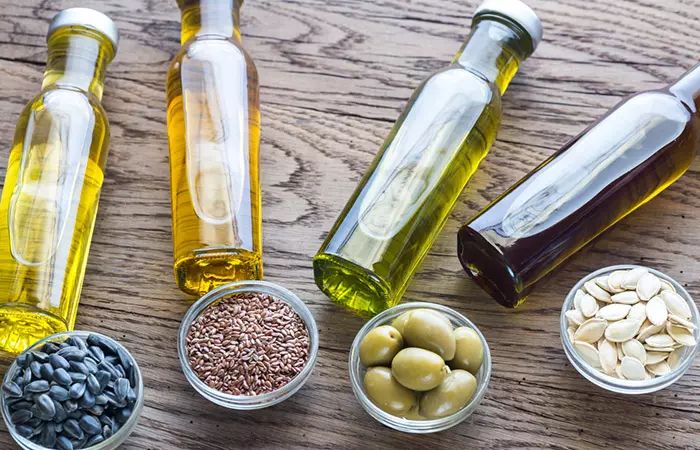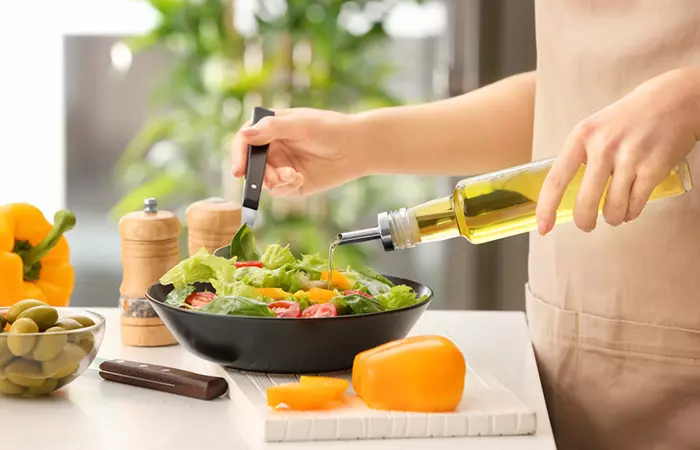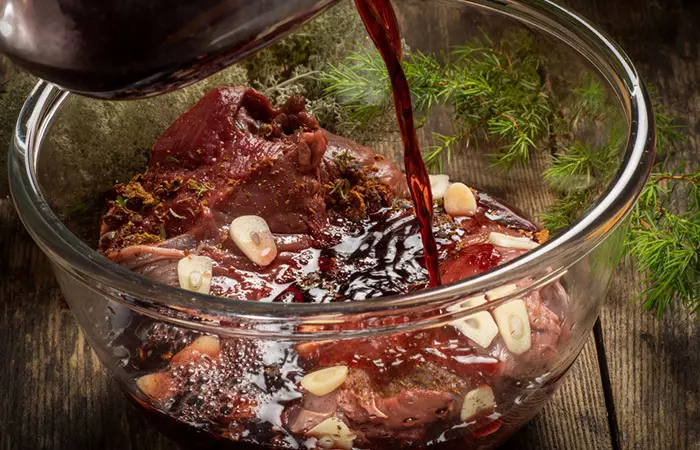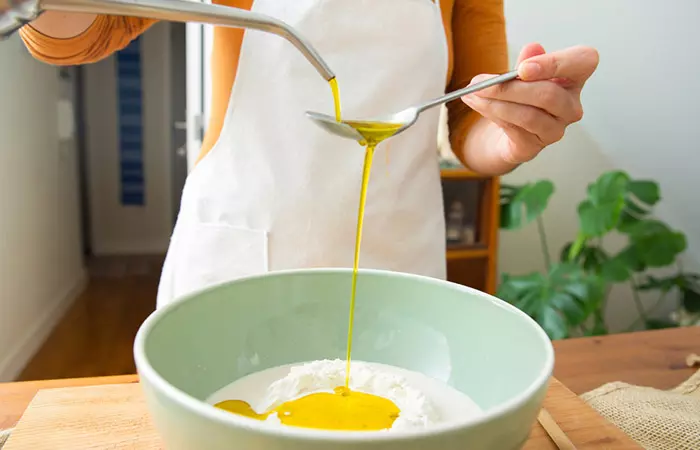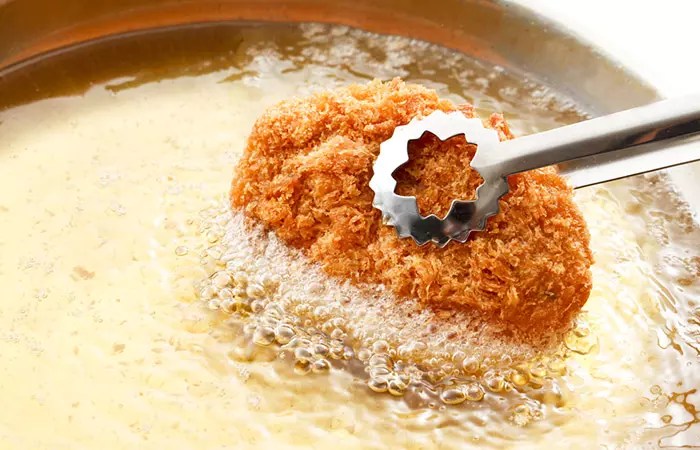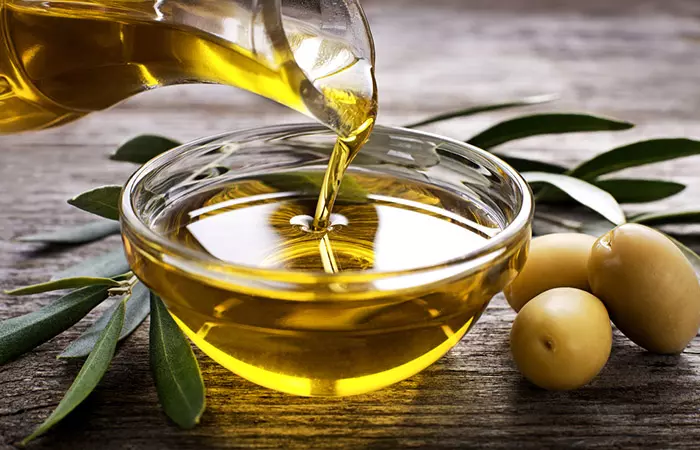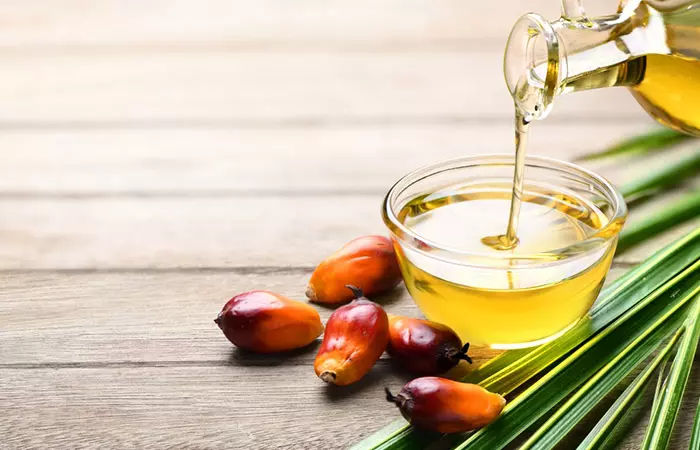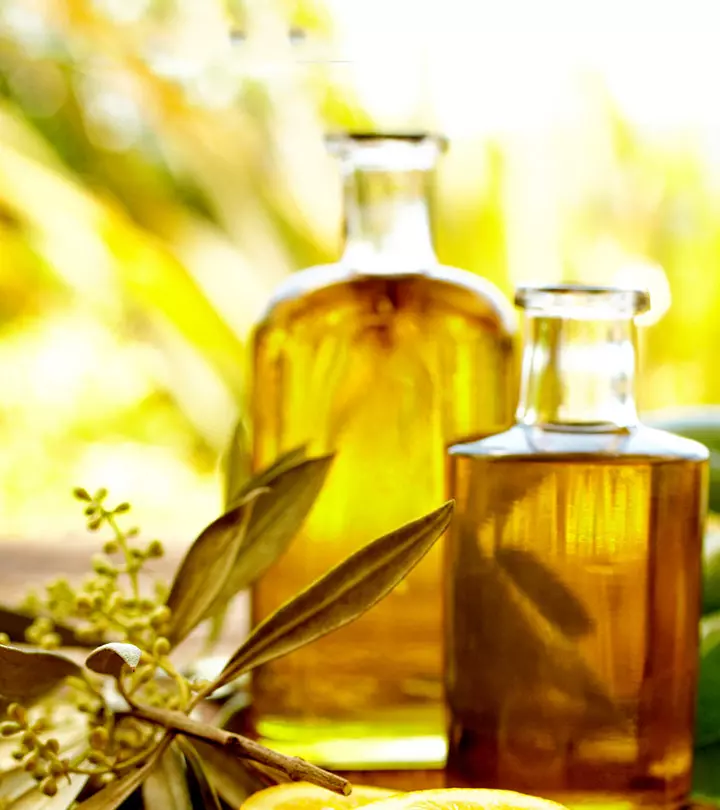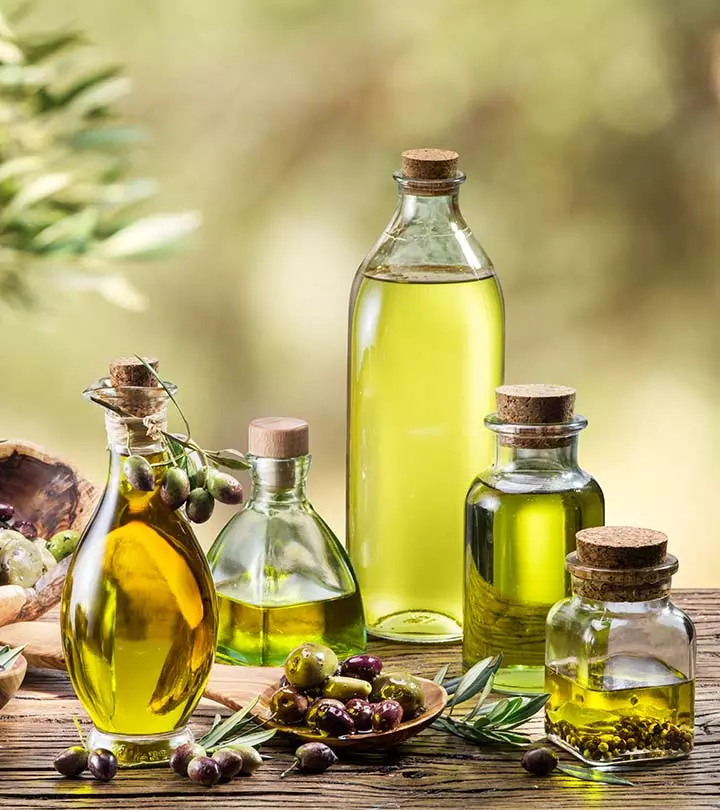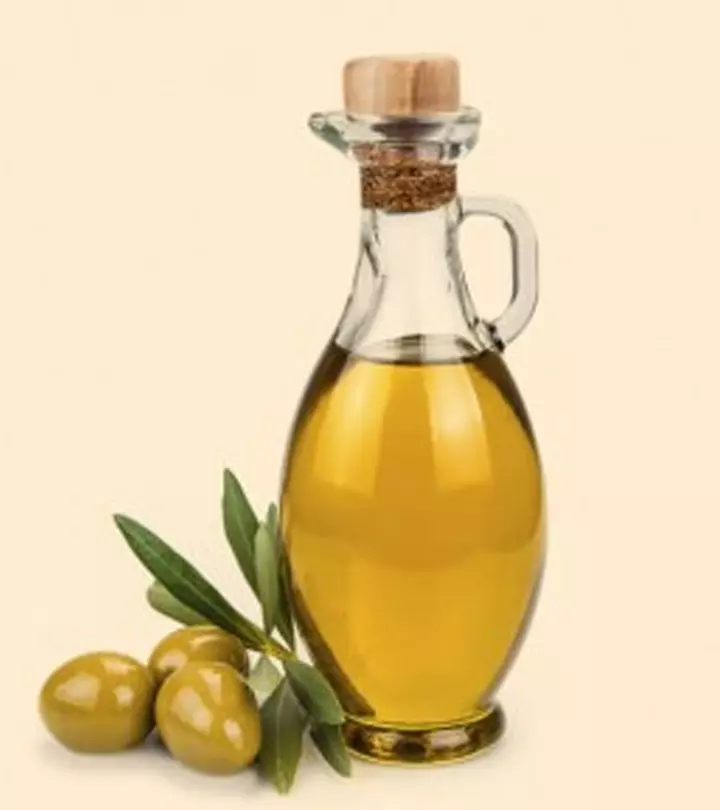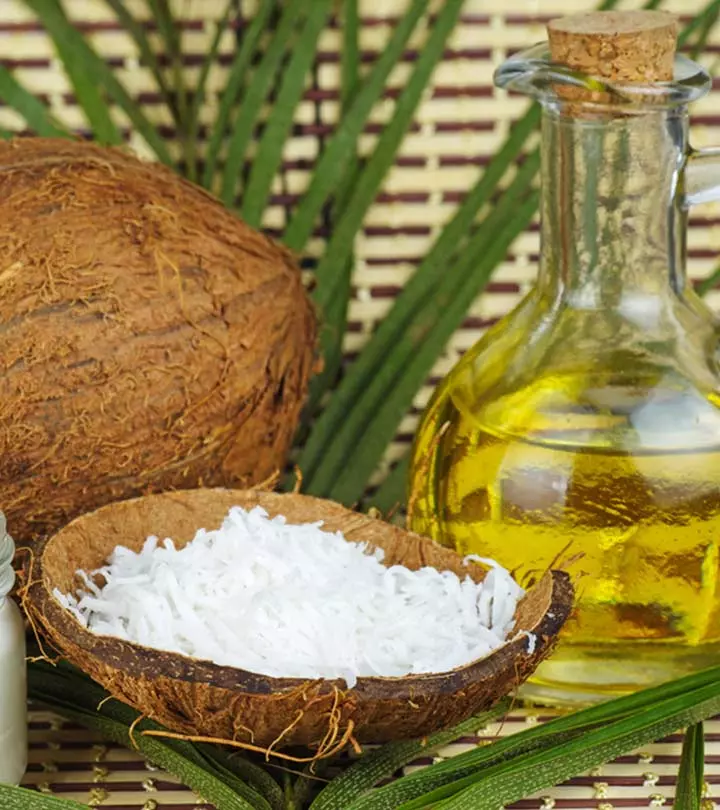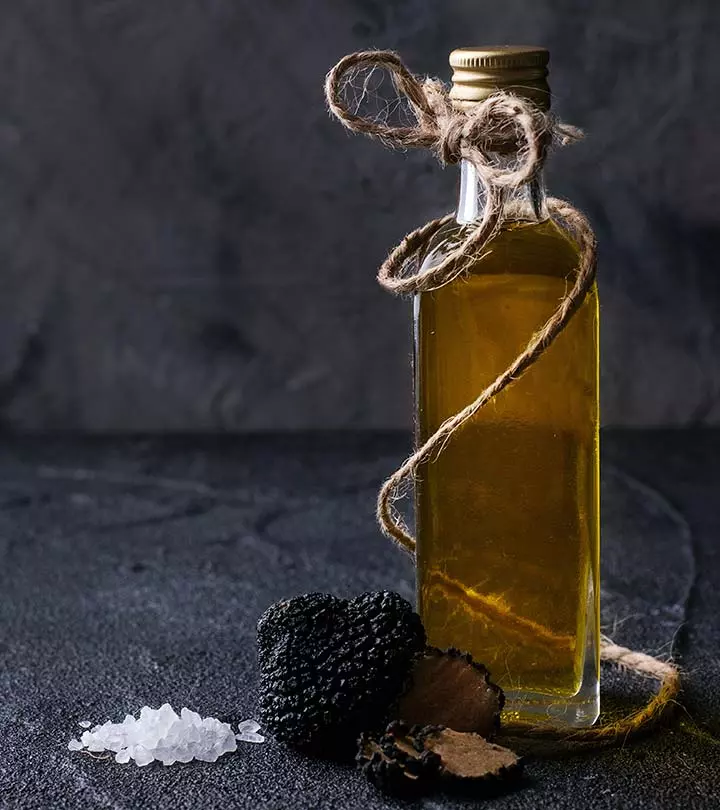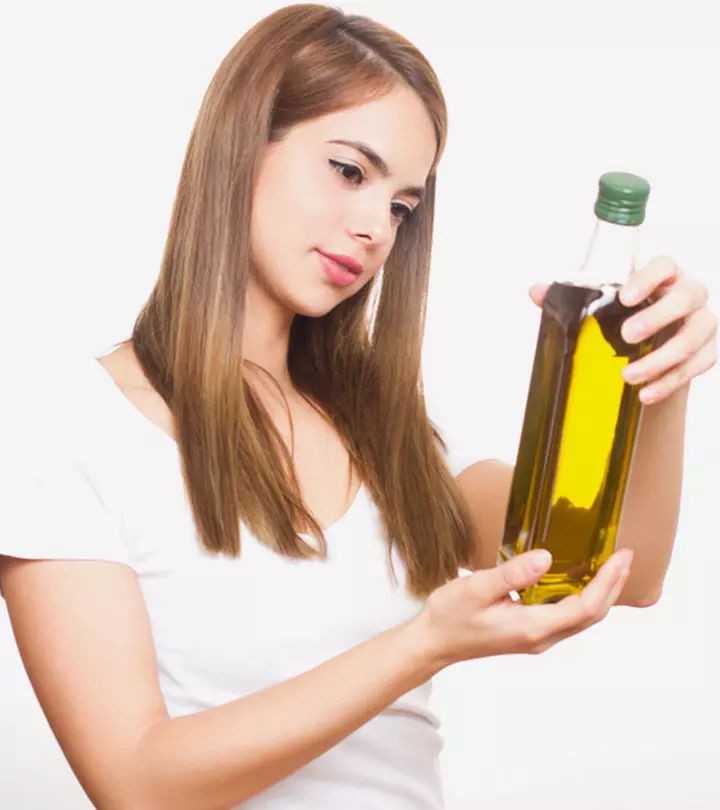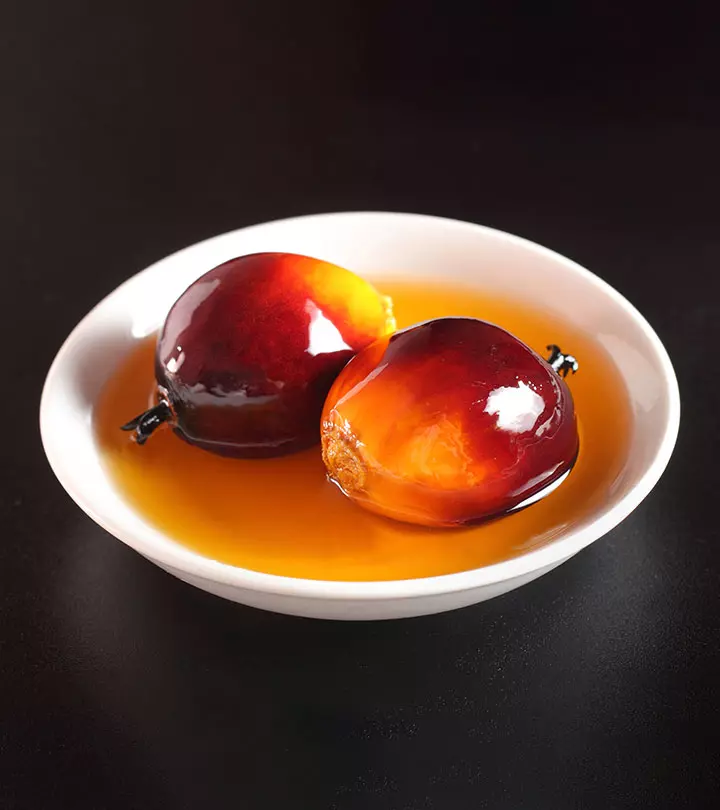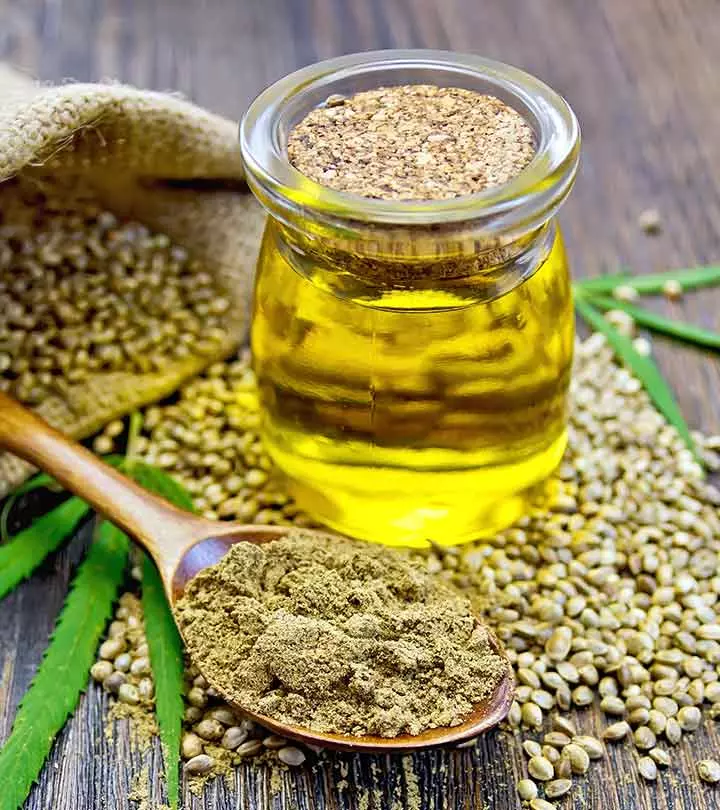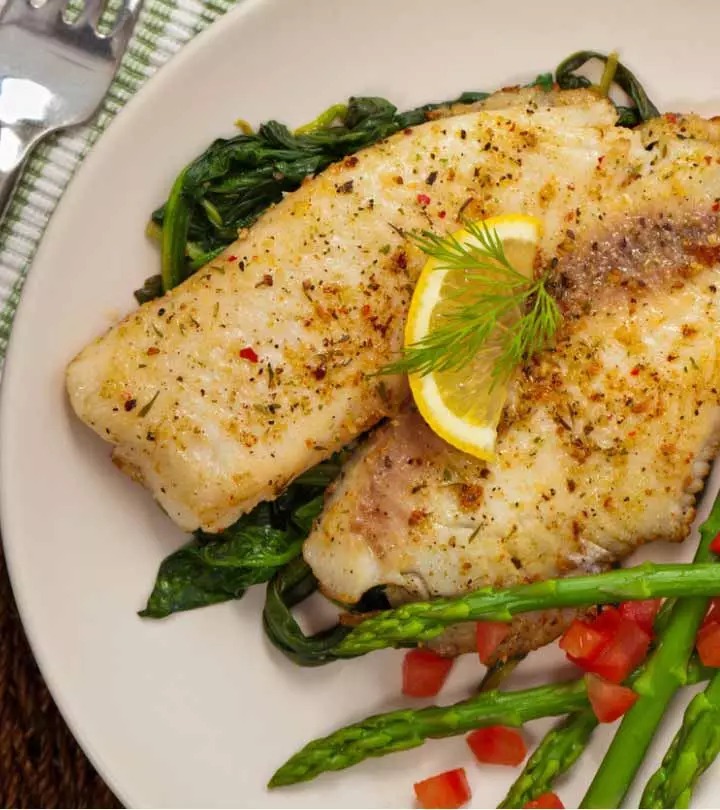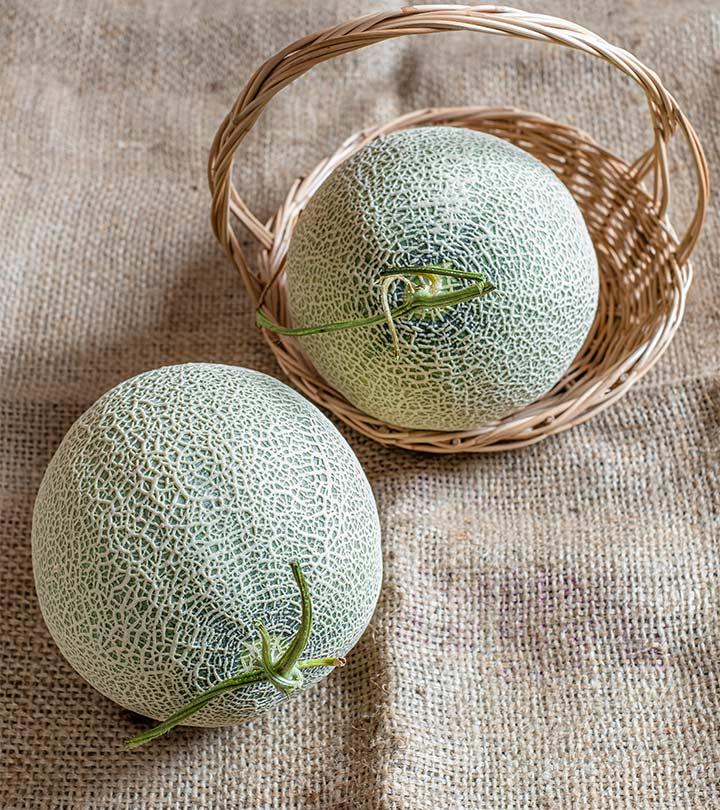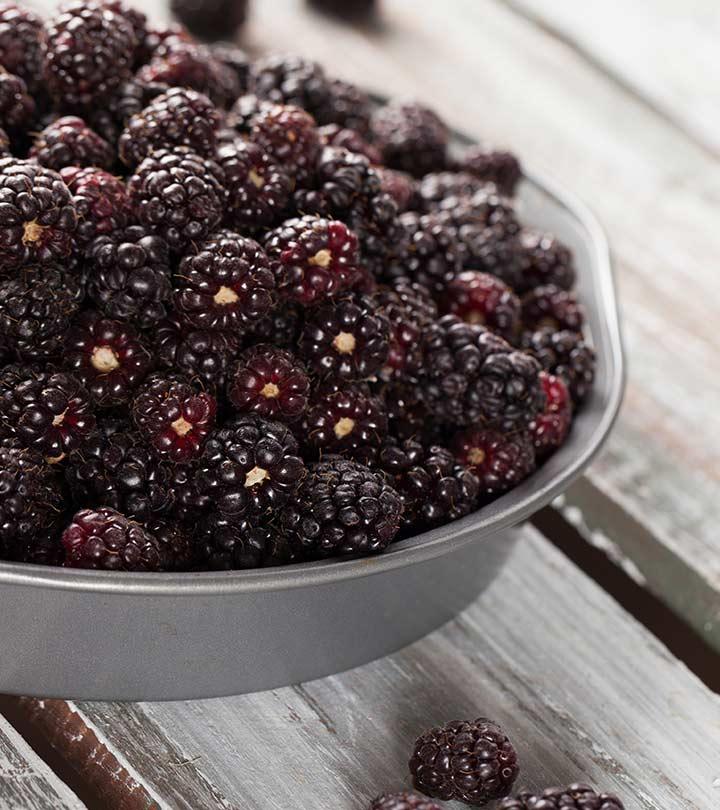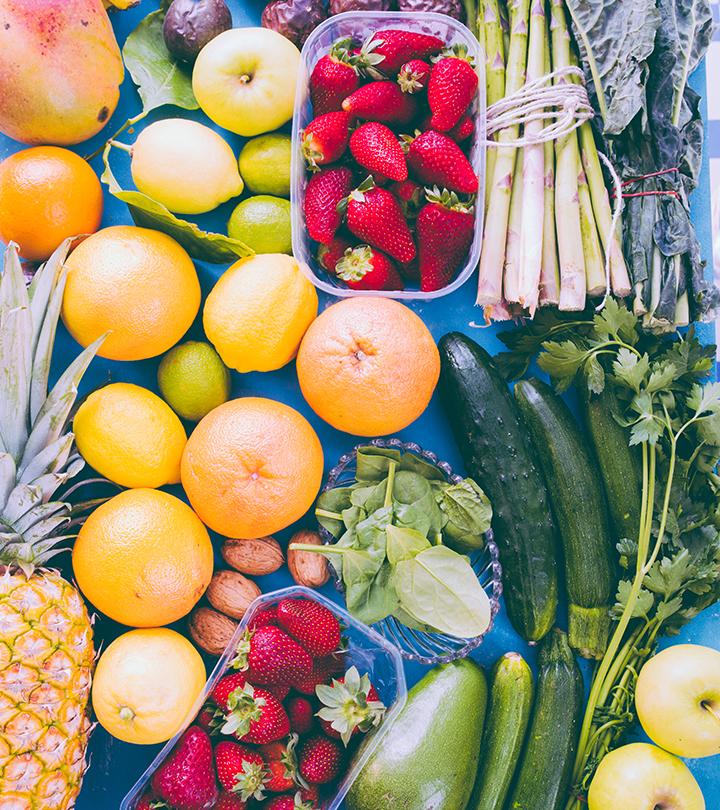Olive Oil Vs. Vegetable Oil: Nutrition Facts And Differences
While both offer numerous benefits, one could be better for you and your family’s health.
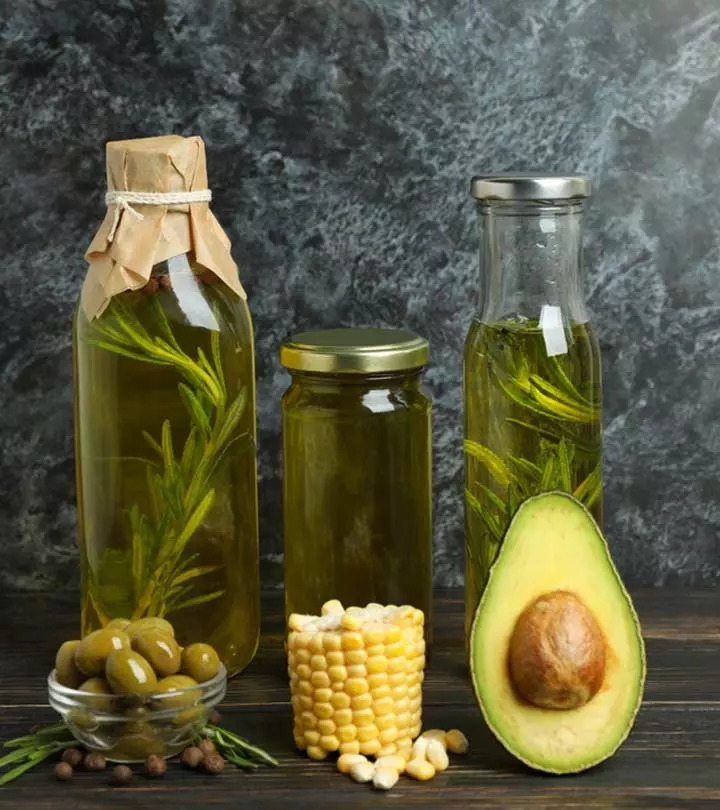
Image: Shutterstock
Be it sauteing, frying, baking, drizzling onto salads, or preventing pasta from sticking together – plant oils are a pantry staple. But when it comes to cooking, the olive oil vs. vegetable oil debate does not seem to end. As each of these oils possess unique characteristics, choosing one for your everyday cooking can be challenging.
The best way to understand which of the two is best for you is to take a closer look at how they differ in terms of nutrition, taste, and potential health benefits. This article focuses on all you need to know about cooking with these oils, when to use which, and which of the two is healthier for you. Keep reading.
In This Article
Can You Use Vegetable Oil Instead Of Olive Oil?
Understanding both the oils in detail can give us an answer to that question.
Vegetable oil extraction mainly occurs from seeds, grains, nuts, or other parts of fruits. Soybean oil, sunflower oil, corn oil, canola oil, peanut oil, and coconut oil are some common vegetable oils. These oils are clean and have a neutral flavor. Therefore, bakers prefer them for adding texture and richness to desserts and other baked items. In addition, they have a significantly higher smoke point, making them better for use in high-heat cooking.
Olive oil is a Mediterranean oil extracted from the fleshy part of the ripened fruit of the olive tree. The oil has plenty of uses, from roasting vegetables to making salad dressings and marinades. However, unlike the vegetable oils, it has a strong fruity flavor that leaves a bitter aftertaste.
In the following section, we will discuss which of the two is ideal to be used for various purposes.
1. Salad Dressing
If you are a fitness enthusiast, this one should be a no-brainer. Extra virgin olive oil is a healthy source of fat. Its regular yet moderate use in your diet may reduce body mass index and blood pressure. It may also reduce the risk of postmenopausal breast cancer, colorectal canceri A collective term for colon and rectal cancer that begins in the last several inches of the large intestine. , and cardiovascular diseasei A group of disorders linked with heart and blood vessels, such as coronary heart disease and peripheral artery disease. (1). So, it is best not to substitute olive oil for vegetable oil when it comes to salad dressing.
 Quick Tip
Quick Tip2. Marination
Marination is the process of soaking lean meat in a seasoned, spiced liquid before cooking it. Oils are an essential ingredient in this process. While you may use either vegetable oil or olive oil here, the latter works best if you wish to add an extra flavor to the dish.
Olive oil provides a sharp and slightly peppery taste to your meat and ensures all spices stick to the surface. This oil also reduces the risk of obesity and type 2 diabetes (2). However, if you do not like the flavor of the oil, you may use other flavorful vegetable oils like sesame or walnut oils.
3. Sauteing And Stir-Frying
Use olive oil if you want a healthy oil packed with potential health benefits. However, if you are looking for an alternative affordable vegetable oil, choose sunflower oil. According to a study, the vitamin C content of broccoli stir-fried with either olive oil or sunflower oil was better than that of other oils (3).
4. Baking
In general, bakers and chefs prefer vegetable oils for baking as these have a neutral flavor. These ensure the baked product achieves the desired fat content with its taste intact. So, you can use vegetable oil for baking.
However, if you still want to use olive oil for baking, we recommend a partial replacement. Simply use both oils in equal ratios and enjoy your favorite baked goodies. In fact, in a study on the Italian Cantuccini biscuits, partial replacement of butter with extra virgin olive oil in the original recipes was found to improve their physical and chemical properties (4 ).
5. Deep-Frying
Can you use olive oil instead of vegetable oil for frying, or is vegetable oil the best option? Talking in terms of smoke point, olive oil is not ideal for deep frying and cannot be used. However, the smoke point alone is not the best indicator for determining this. Some evidence shows that olive oil is much more stable when heated than other vegetable oils (5).
Olive oil is one of the reasons the Mediterranean diet is so popular among the masses (6). However, you can easily replace it with an affordable and nutritious vegetable oil like mustard oil as deep frying requires a lot of it.
 Quick Tip
Quick TipWhile both olive and vegetable oils seem to have their own advantages, the two are different in their own ways. Let us explore the same in the next section.
Differences Between Olive Oil And Vegetable Oil
1. Source And Types
Olive oil is made from the fleshy part of the ripened olive fruit. It is available in the extra virgin, virgin, and blended variants. Vegetable oils, on the other hand, come from different plant sources, such as seeds, grains, and nuts. Here are two common types of vegetable oils you should know about:
- Processed Oils: These oils are produced by crushing the seeds under high temperatures in machines at a very high speed. They are also known as hot-pressed oils or refined oils. You can easily find them at any grocery store.
- Cold-Pressed Oils: These oils are produced naturally by crushing the seeds at room temperature. Their production does not involve extra heat and chemicals, making them the healthier option. Besides olive oil and vegetable oil, some other varieties of cold-pressed oil include macadamia, sesame seed, safflower, flaxseed, hemp seed, and rapeseed oils.
2. Fat Composition
A study was conducted to find out whether a Mediterranean diet supplemented with extra-virgin olive oil and nuts may help prevent cardiovascular diseases. A total of 7447 participants were selected who were at high cardiovascular risk. With a Mediterranean diet, the hazard ratio, meaning the occurrence of cardiovascular disease, was at the lowest at 0.69, while a Mediterranean diet with nuts was at 0.72.
Olive oil is composed of 14% saturated fat and 85% monounsaturated fat (7). It has a higher percentage of good fats, making it an excellent option for weight loss and better heart health. Vegetable oils, on the other hand, contain different fat compositions. Coconut oil, for example, has the highest amount of saturated fat (8). However, this does not mean all vegetable oils are unhealthy. You can still find vegetable oils, like sunflower oil, that are comparatively safe and healthy.
3. Processing And Flavor
Extra virgin oil is minimally processed, due to which it has a distinct taste of olives and contains more nutrients. However, vegetable oils often undergo more processing. While this removes impurities from the oils and prolongs their shelf life, the oils lose most of their nutrients and become a neutral blend.
4. Nutrients
Olive oil contains higher amounts of good fats like oleic acid and linoleic acid (7). Further, since extra virgin olive oil goes through the least amount of processing, it also contains vitamins E and K. The oil is also rich in antioxidants, such as carotenoids and polyphenols, which boost immunity, slow down skin aging, and provide protection against certain cancers, diabetes, and heart disease (9), (10). In comparison to olive oil, most vegetable oils are highly processed and are high in saturated fats, their excess consumption may cause cholesterol build-up in your arteries. Further, other vegetable oils also have fewer nutrients and antioxidants (11).
While these are the differences, olive oil and vegetable oil have some similarities too. Let us explore them in the next section.
Similarities Between Olive Oil And Vegetable Oil
1. Olive Oil Is Technically A Vegetable Oil
Olive oil is a type of vegetable oil. Vegetable oils or cooking oils usually come from seeds, nuts, or any part of a fruit. Olive oil extraction occurs from the fleshy part of an olive, a fruit. However, while olive oil is a vegetable oil, not all vegetable oils are extracted from olives.
2. Both Have A Similar Smoke Point
Olive oil and vegetable oil have nearly the same smoke point, sitting around 400°F (205°C). The fat composition of the oil, above this temperature, starts breaking down into glycerol and free fatty acids. These, in excess, may elevate the risk of heart disease and diabetes (12).
Further, since both oils have a similar smoke point, you may use olive oil for frying on medium/low heat. As per a study, refined olive oil is one of the most stable oils you can use during pan and deep frying (13). Therefore, the only people who need to avoid it are those who are not okay with the oil’s unique flavor.
3. Both Have Processed Varieties
While extra virgin olive oil is the least processed oil, it has other variants too. Refined olive oil is highly processed and, like vegetable oil, lacks many nutrients. Processed olive oil also lacks its distinctive taste.
 Quick Tip
Quick TipNutritional information is another factor you must consider before choosing between olive oil and vegetable oil. Continue reading to know more.
Nutritional Facts Of Olive Oil And Vegetable Oil
Olive Oil Nutrition Facts
One tablespoon of olive oil contains the following nutrients (14):
- Calories: 119 kcal
- Fat: 13.5 g
- Carbohydrates: 0 g
- Calcium: 0.135 mg
- Iron: 0.076 mg
- Sugars: 0 g
- Potassium: 0.135 mg
- Sodium: 0.27 mg
- Vitamin E: 1.94 mg
- Fiber: 0 g
- Protein: 0 g
- Vitamin K: 8.13 µg
One tablespoon of olive oil has 13.5 g of total fat, the majority of which are monounsaturated and polyunsaturated fats. These are good fats and may reduce the risk of heart disease when substituted for oils high in saturated fats (7). However, since olive oil is calorie-dense, you must consume it in moderation.
Along with healthy fats, olive oil also contains essential micronutrients. The potassium in the oil plays a role in muscle contraction. It also supports healthy kidneys and heart function. Further, the oil has vitamin E that boosts immunity and promotes skin health. The vitamin K in the oil helps with blood clotting and bone formation (9).
Vegetable Oil Nutrition Facts
One tablespoon of palm kernel oil (a vegetable oil) contains the following nutrients (15):
- Calories: 117 kcal
- Fat: 13.6 g
- Carbohydrates: 0 g
- Fiber: 0 g
- Calcium: 0 mg
- Iron: 0 mg
- Potassium: 0 mg
- Sodium: 0 mg
- Sugars: 0 g
- Vitamin E: 0.518 mg
- Vitamin K: 3.36 µg
- Protein: 0 g
Palm kernel oil has nearly the same amount of fat as olive oil. However, the significant difference lies in the type of fats it has. This oil is high in saturated fats, the excess of which is linked with heart disease (16). Excess consumption of these fats can increase the amount of LDL cholesteroli Bad cholesterol which, in excess, can build up inside your blood vessel walls and lead to heart disease and stroke. in the blood. Further, while this oil has significant quantities of vitamins E and K, they are less than that of olive oil. Palm kernel oil’s processing reduces its nutrient content.
Palm kernel oil is not the only vegetable oil you can use apart from olive oil for cooking. Numerous other oils are also comparatively healthy and rich in nutrients, including that of canola, corn, peanut, safflower, soybean, and sunflower. However, all these oils too, like olive oil, are calorie-dense. So, irrespective of the oil you choose, consume it in moderation.
You also can mix olive oil and any other vegetable oil. But ensure their different flavors do not clash. For instance, both olive oil and coconut oil have distinct tastes. So, mixing them would ruin the flavor of the resultant oil altogether. If you must combine a flavorful oil (like olive oil) with other oils, look for neutral-flavored oils such as safflower oil or peanut oil.
Olive Oil Vs. Vegetable Oil: Which Is The Healthier Choice?
Olive oil gets the points. It has a higher content of good fats like omega-3 fatty acids. Further, the extra virgin variant of olive oil is the least processed and retains all of its essential nutrients and antioxidants. Hence, it has potential anticancer, antidiabetic, antioxidant, and antiinflammatory properties.
Vegetable oil contains mostly omega-6 polyunsaturated fats other than saturated fats. While they are slightly better than saturated fats, they are still linked to poor heart health. Most vegetable oils undergo a lot of refining, which leaves them with little to no micronutrients.
Thus, the healthiest of the two is extra virgin olive oil. Other than that, cold-pressed oils, such as mustard or groundnut oils, are a great option if your food requires cooking at high temperatures.
While olive oil is healthier, can you substitute it entirely for vegetable oil while cooking? Let us find out.
Olive Oil Vs. Vegetable Oil: How To Choose Them For Cooking?
Both these oils are kitchen staples. However, always using extra virgin olive oil for cooking can be heavy on the pocket due to its price. Also, using it in some culinary dishes can change their flavor altogether. Hence, finding a balance between the two oils is ideal. The following tips can help:
- Choose olive oil when preparing salad dressings and dips. You may also try walnut or flaxseed oils if you do not like olive oil’s strong flavor.
- Olive oil is ideal for marinades as it adds a strong and peppery flavor to meat and other foods.
- Switch to olive oil for sauteing and stir-frying if you want to practice healthy and proper weight management. However, keep the amount of oil limited to avoid reverse effects.
- Stick to neutral vegetable oils for baking. Use olive oil only if the recipe demands so.
- Opt for light virgin olive oil or vegetable oil for deep frying and oven-cooking. You can also choose peanut oil, canola oil, and grape seed oil as alternatives.
- Virgin olive oil works amazingly well for sauces and low-heat baking. But you may still go with sesame or soybean oil if you need a vegetable oil alternative.
Let us conclude this section by answering another crucial question – is olive oil vegan? Olive oil comes from a plant source and is vegan. However, the oil may not be the first choice for those considering sustainability along with animal welfare. Many activists claim that the production of olive trees has an adverse environmental impact. If you have similar concerns, you may go for vegetable oils like that of coconut, walnut, or avocado.
Infographic: How To Choose Olive Oil Vs. Vegetable Oil For Cooking
Sauteed vegetables, caramelized onions, golden brown crusted chicken, and elevated flavors – there is a lot that cooking oils can do. However, not all oils are the same. Some can be healthy, while others can be full of saturated fats that increase bad cholesterol. In such a situation, it is common to have the olive oil vs. vegetable oil dilemma. Scroll down to the infographic below to learn how to choose between these oils for cooking.

Illustration: StyleCraze Design Team
Final Words
Olive oil is a clear winner in the olive oil vs. vegetable oil debate. It contains many good fats like oleic acid and linoleic acid and is rich in vitamins E and K and antioxidants. You can readily use the oil for everyday cooking, baking, frying, and sauteing. While other vegetable oils may not be as healthy as olive oil, some options are a close competition. These include canola, walnut, peanut, and mustard oils. You can easily substitute these vegetable oils for olive oil, depending on your cooking needs. However, keep the consumption of any oil minimal as they are all calorie-dense.
Frequently Asked Questions
Can you use olive oil instead of vegetable oil for frying?
Yes, you can use olive oil instead of vegetable oil for frying. However, since the oil is a bit expensive, you can look for affordable vegetable oil alternatives like that of sunflower or soybean.
Is olive oil better than vegetable oil for cholesterol reduction?
Yes, olive oil is better than vegetable oils for lowering bad cholesterol levels. The former is rich in monounsaturated fats that play a role in this regard.
Are there types of cuisine or dishes that are better suited to one type of oil over others?
Not in particular, but olive oil is usually not preferred for dishes that require deep frying and baking because of its low smoke point.
Can applying olive oil or vegetable oil topically help improve dry or flaky skin, and if so, how?
Vegetable oils such as sunflower oil can help improve dry and flaky skin. However, olive oil does not help with moisturization. A study conducted on the two found that olive oil damages the skin barrier while sunflower oil improves hydration (17).
Does olive oil cleanse the liver?
Yes, it has high levels of monounsaturated fatty acids and phenolic compounds which help prevent inflammation, oxidative stress, endoplasmic reticulum stress, mitochondrial dysfunction, and insulin resistance (18).
Key Takeaways
- Vegetable oil extraction mainly occurs from seeds, nuts, or other parts of fruits. Soybean oil, sunflower oil, olive oil, and coconut oil are all examples of vegetable oils.
- oil are all examples of vegetable oils.
- Olive oil is a kind of vegetable oil extracted from the fleshy part of the ripened fruit of the olive tree.
- While olive oil and vegetable oils have saturated fats, the former is richer in healthy fats that can reduce bad cholesterol.
- Olive oil is healthier than most vegetable oils. However, all oils are calorie-dense and must be consumed in moderation.
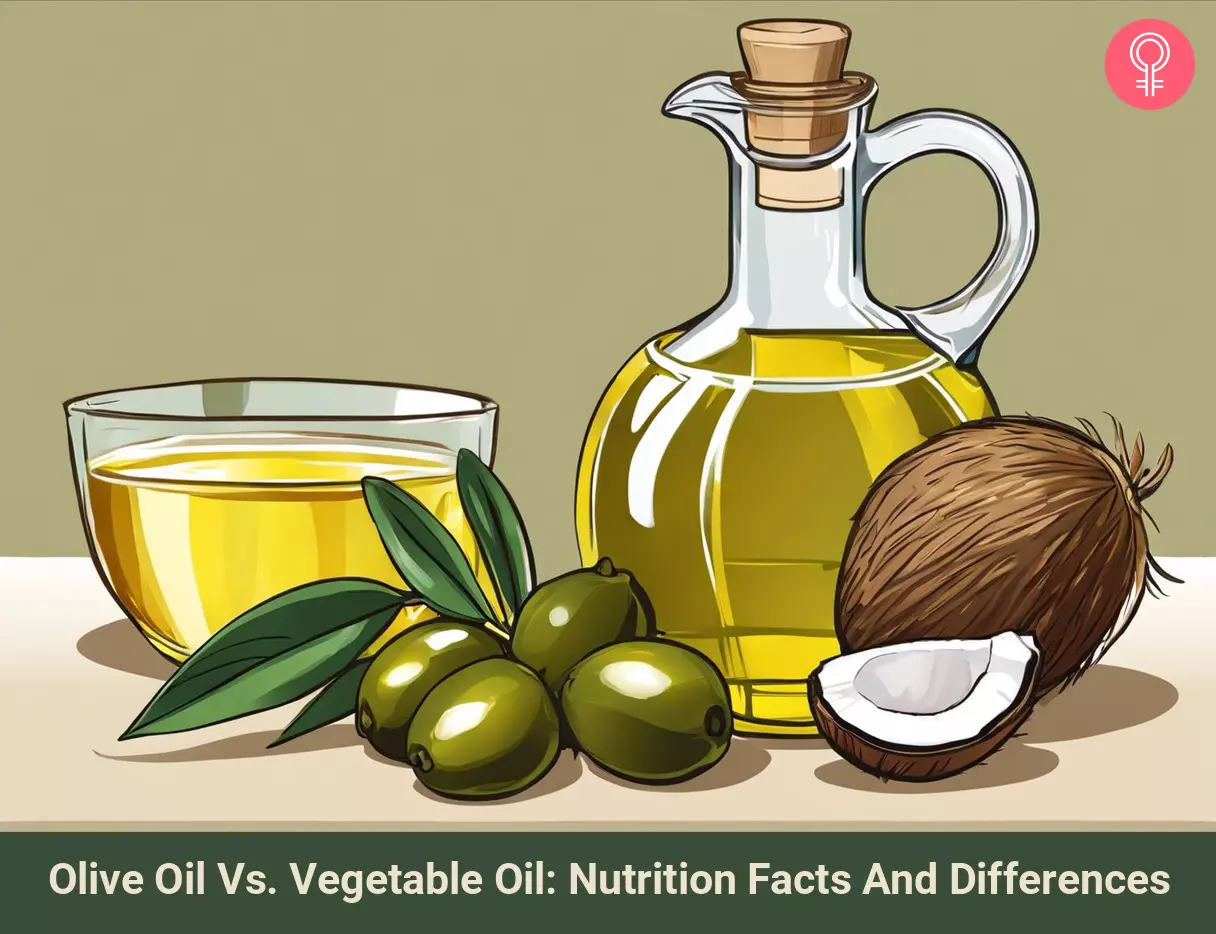
Image: Stable Diffusion/StyleCraze Design Team
Discover the amazing benefits of olive oil! Learn why you should use it for cooking and why it’s the best choice for your health. Get the facts in this informative video!
References
Articles on StyleCraze are backed by verified information from peer-reviewed and academic research papers, reputed organizations, research institutions, and medical associations to ensure accuracy and relevance. Read our editorial policy to learn more.
- Virgin Olive Oil And Health: Summary Of The Iii International Conference On Virgin Olive Oil And Health Consensus Report Jaen (Spain) 2018
https://pubmed.ncbi.nlm.nih.gov/30487558/ - May The Mediterranean Diet Attenuate The Risk Of Type 2 Diabetes Associated With Obesity: The Seguimiento Universidad De Navarra (Sun) Cohort
https://pubmed.ncbi.nlm.nih.gov/28625175/ - Effects Of Stir-Fry Cooking With Different Edible Oils On The Phytochemical Composition Of Broccoli
https://pubmed.ncbi.nlm.nih.gov/17995900/ - Effects Of Shortening Replacement With Extra Virgin Olive Oil On The Physical–Chemical–Sensory Properties Of Italian Cantuccini Biscuits
https://www.ncbi.nlm.nih.gov/pmc/articles/PMC8834388/ - Cooking With Extra Virgin Olive Oil
https://www.researchgate.net/publication/351401180_Cooking_with_Extra_Virgin_Olive_Oil - Definitions And Potential Health Benefits Of The Mediterranean Diet: Views From Experts Around The World
https://www.ncbi.nlm.nih.gov/pmc/articles/PMC4222885/ - Bioactive Compounds And Quality Of Extra Virgin Olive Oil
https://www.ncbi.nlm.nih.gov/pmc/articles/PMC7466243/ - Coconut Oil Consumption And Cardiovascular Risk Factors In Humans
https://www.ncbi.nlm.nih.gov/pmc/articles/PMC4892314/ - Potential Health Benefits Of Olive Oil And Plant Polyphenols
https://www.ncbi.nlm.nih.gov/pmc/articles/PMC5877547/ - Effect Of Extra Virgin Olive Oil And Table Olives On The Immuneinflammatory Responses: Potential Clinical Applications
https://pubmed.ncbi.nlm.nih.gov/29141570/ - Total Antioxidant Activity Of Selected Vegetable Oils And Their Influence On Total Antioxidant Values In Vivo: A Photo Chemiluminescence Based Analysis
https://pubmed.ncbi.nlm.nih.gov/24996369/ - Glycerol And Fatty Acids In Serum Predict The Development Of Hyperglycemia And Type 2 Diabetes In Finnish Men
https://www.ncbi.nlm.nih.gov/pmc/articles/PMC3816902/ - Monitoring Of Quality And Stability Characteristics And Fatty Acid Compositions Of Refined Olive And Seed Oils During Repeated Pan- And Deep-Frying Using Gc Ft-Nirs And Chemometrics
https://pubmed.ncbi.nlm.nih.gov/25264922/ - Oil Olive Salad Or Cooking
https://fdc.nal.usda.gov/fdc-app.html#/food-details/171413/nutrients - Vegetable Oil Palm Kernel
https://fdc.nal.usda.gov/fdc-app.html#/food-details/171422/nutrients - Saturated Fatty Acids And Cardiovascular Disease: Replacements For Saturated Fat To Reduce Cardiovascular Risk
https://www.ncbi.nlm.nih.gov/pmc/articles/PMC5492032/ - Effect Of Olive And Sunflower Seed Oil On The Adult Skin Barrier: Implications For Neonatal Skin Care
https://pubmed.ncbi.nlm.nih.gov/22995032/ - Liver Protective Effects of Extra Virgin Olive Oil: Interaction between Its Chemical Composition and the Cell-signaling Pathways Involved in Protection
https://pubmed.ncbi.nlm.nih.gov/29141573/
- Virgin Olive Oil And Health: Summary Of The Iii International Conference On Virgin Olive Oil And Health Consensus Report Jaen (Spain) 2018
- Virgin Olive Oil And Health: Summary Of The Iii International Conference On Virgin Olive Oil And Health Consensus Report Jaen (Spain) 2018
https://pubmed.ncbi.nlm.nih.gov/30487558/ - May The Mediterranean Diet Attenuate The Risk Of Type 2 Diabetes Associated With Obesity: The Seguimiento Universidad De Navarra (Sun) Cohort
https://pubmed.ncbi.nlm.nih.gov/28625175/ - Effects Of Stir-Fry Cooking With Different Edible Oils On The Phytochemical Composition Of Broccoli
https://pubmed.ncbi.nlm.nih.gov/17995900/ - Effects Of Shortening Replacement With Extra Virgin Olive Oil On The Physical–Chemical–Sensory Properties Of Italian Cantuccini Biscuits
https://www.ncbi.nlm.nih.gov/pmc/articles/PMC8834388/ - Cooking With Extra Virgin Olive Oil
https://www.researchgate.net/publication/351401180_Cooking_with_Extra_Virgin_Olive_Oil - Definitions And Potential Health Benefits Of The Mediterranean Diet: Views From Experts Around The World
https://www.ncbi.nlm.nih.gov/pmc/articles/PMC4222885/ - Bioactive Compounds And Quality Of Extra Virgin Olive Oil
https://www.ncbi.nlm.nih.gov/pmc/articles/PMC7466243/ - Coconut Oil Consumption And Cardiovascular Risk Factors In Humans
https://www.ncbi.nlm.nih.gov/pmc/articles/PMC4892314/ - Potential Health Benefits Of Olive Oil And Plant Polyphenols
https://www.ncbi.nlm.nih.gov/pmc/articles/PMC5877547/ - Effect Of Extra Virgin Olive Oil And Table Olives On The Immuneinflammatory Responses: Potential Clinical Applications
https://pubmed.ncbi.nlm.nih.gov/29141570/ - Total Antioxidant Activity Of Selected Vegetable Oils And Their Influence On Total Antioxidant Values In Vivo: A Photo Chemiluminescence Based Analysis
https://pubmed.ncbi.nlm.nih.gov/24996369/ - Glycerol And Fatty Acids In Serum Predict The Development Of Hyperglycemia And Type 2 Diabetes In Finnish Men
https://www.ncbi.nlm.nih.gov/pmc/articles/PMC3816902/ - Monitoring Of Quality And Stability Characteristics And Fatty Acid Compositions Of Refined Olive And Seed Oils During Repeated Pan- And Deep-Frying Using Gc Ft-Nirs And Chemometrics
https://pubmed.ncbi.nlm.nih.gov/25264922/ - Oil Olive Salad Or Cooking
https://fdc.nal.usda.gov/fdc-app.html#/food-details/171413/nutrients - Vegetable Oil Palm Kernel
https://fdc.nal.usda.gov/fdc-app.html#/food-details/171422/nutrients - Saturated Fatty Acids And Cardiovascular Disease: Replacements For Saturated Fat To Reduce Cardiovascular Risk
https://www.ncbi.nlm.nih.gov/pmc/articles/PMC5492032/ - Effect Of Olive And Sunflower Seed Oil On The Adult Skin Barrier: Implications For Neonatal Skin Care
https://pubmed.ncbi.nlm.nih.gov/22995032/ - Liver Protective Effects of Extra Virgin Olive Oil: Interaction between Its Chemical Composition and the Cell-signaling Pathways Involved in Protection
https://pubmed.ncbi.nlm.nih.gov/29141573/
Read full bio of Dr. Pallavi Srivastava
Read full bio of Arshiya Syeda
Read full bio of Sindhu Koganti





